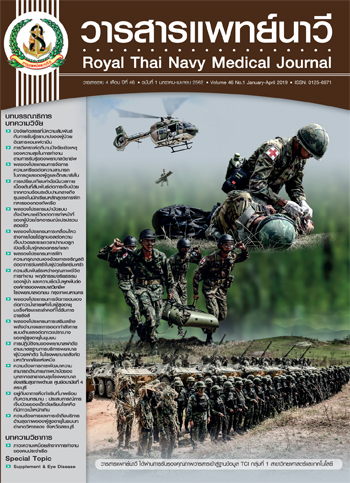The Effect of Mindful Self-Compassion Training Program on Depression in Persons with Depressive Disorder
Main Article Content
Abstract
This research is a quasi-experimental pretest-posttest control group design. The objectives were to compare: 1) depressive symptoms of patients with depressive disorder before and after received mindful self-compassion training program, and 2) depressive symptoms of patients with depressive disorder who received mindful self-compassion training program and those who received regular nursing care. The samples of 40 adult patients with depressive disorder, who met the inclusion criteria, were receiving services in out-patients department, Bang Bua Thong Hospital. They were matched-pairs by sex and severity of depression and then randomly assigned to either the experimental or control groups, 20 subjects in each group. The experimental group received the mindful self-compassion training program, while the control group received the regular nursing care. Research instruments comprised of: 1) the experimental tool is mindful self-compassion training program, 2) data collection tools including demographic data form and Beck Depression Inventory Scale (BDI), and 3) the experimental monitoring tool is Ruminative Response Scale. The content validity of all instruments had verified by 5 professional experts. The Beck Depression Inventory Scale (BDI), and the Ruminative Response Scale had Cronbach's alpha reliability as of 0.87 and 0.84, respectively. Descriptive statistics and t-test were used in data analysis.
The conclusions of this research were as follows:
1) the depression score of persons with depressive disorder after received the mindful self-compassion training program was significantly lower than that before at the .05 level.
2) the depression score of persons with depressive disorder after received the mindful self-compassion training program was significantly lower than those who received regular nursing care at the .05 level.
Article Details

This work is licensed under a Creative Commons Attribution-NonCommercial-NoDerivatives 4.0 International License.
References
2.ประภาส อุครานันท์. เอกสารทบทวนความสูญเสียอันเนื่องจากโรคซึมเศร้ากับการเข้าถึงบริการผู้ป่วยโรคซึมเศร้า. ปทุมธานี: ติดตามผลการดําเนินงานการเข้าถึงบริการผู้ป่วยโรคซึมเศร้า; 2560.
3.Ministry of Public Health. Health data center. [Internet]. [cited 2016 November 1]. Available from: https://hdcservice.moph.go.th/hdc/main/index_pk.php.
4.Lueboonthavatchai O, Lueboonthavatchai P. Psychosocial treatment for depressive disorder. Bangkok: Tanapress; 2010. (in Thai).
5.Lotrakul M, Sukanit P. Psychiatry Ramathibodi. Bangkok: Beyond Enterprise. 2015. (in Thai).
6.Beck AT. Depression: clinical experimental and theoretical aspects. New York: Harper Row; 1967.
7.Chunjam S, Sangon S, Thaweekoon T. A survey of depression research in Thailand. Rama Nurs J 2011;17(3):412-26. (in Thai).
8.Nolen-Hoeksema S. Responses to depression and their effects on the duration of depressive episodes. J Abnorm Psychol 1991;100(4):569-82.
9.Nolen-Hoeksema S. The role of rumination in depressive disorders and mixed anxiety/depressive symptoms. J Abnorm Psychol 2000;109(3):504-11.
10.Nolen-Hoeksema S, Wisco BE, Lyubomirsky S. Rethinking rumination. Perspectives on Psychological Science 2008;3(5):400-24.
11.Watkins ER. Constructive and unconstructive repetitive thought. Psychological Bulletin 2008;134(2):163-206.
12.Gamefski N, Legerstee J, Kraaij V, Van den Kommer T, Teerds J. Cognitive coping strategies and symptoms of depression and anxiety: a comparison between adolescents and adults. Journal of Adolescence 2002;25(6):603-11.
13.Papageorgiou C, Wells A. Depressive rumination: nature theory and treatment. Chichester: Wiley; 2004.
14.Rungreangkulkij S, Thongyot S, Kotnara I, Wannatong K. Efficacy of Buddhist counseling on decrease depressive symptoms of patients with depressive disorder. J Psychiatr Assoc Thailand 2014;59(4):381-93. (in Thai).
15.Neff KD, Germer CK. A pilot study and randomized controlled trial of the Mindful Self-Compassion program. J Clin Psychol 2013;69(1):28-44.
16.Raes F. The effect of self-compassion on the development of depression symptoms in a non-clinical sample. Mindfulness 2011;2(1):33-6.
17.Van Dam NT, Sheppard SC, Forsyth JP, Earleywine M. Self-compassion is a better predictor than mindfulness of symptom severity and quality of life in mixed anxiety and depression. J Anxiety Disord 2011;25(1):123–30.
18.Gilbert P, McEwan K, Catarino F, Baião R. Fears of compassion in a depressed population implication for psychotherapy. J Depress Anxiety 2014: S2:003. doi:10.4172/2167-1044.S2-003.
19.Neff KD, McGehee P. Self-compassion and psychological resilience among adolescents and young adults. Self and Identity 2010;9:225-40.
20.MacBetha A, Gumleya A. Exploring compassion: a meta-analysis of the association between self-compassion and psychopathology. Clinical Psychology Review 2012;32(6):545–52.
21.Neff KD, Germer CK. Self-compassion in clinical practice. Journal of Clinical Psychology 2013;69(8):1-12.
22.C-Maharsujchakuen K. What is the Buddha's enlightenment?: and the use of organizational management [Internet]. [cited 2017 March 18]. Available from: https://srn.onab.go.th/index.php?option=com_ content&view=article&id=245:q-q&catid=41:2008-10-29-14-40-50&Itemid=75.
23.Heinrich Heine Universität Düsseldorf. G*Power: statistical power analyses for windows and mac. [Internet]. [cited 2017 January 4]. Available from: https://www.psycho.uni-duesseldorf.de/abteilungen/aap/gpower3/.
24.Areekit P. The effect of cognitive behavioral therapy and mindfulness on depression in depressive disorder patients. [Master’s Thesis, Faculty of Nursing]. Chulalongkorn University; 2011. (in Thai).
25.Thanoi W, Panitrat R, Phancharoenworakul K, Thompson EA, Nityasuddhi D. The Adolescent Ruminative Response Scale (Thai version): psychometric properties. J Nurs Sci 2011;29(2):29-38. (in Thai).


